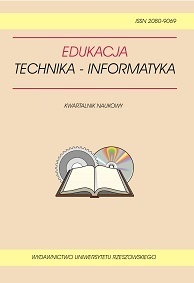The Methodology of Professional Competencies Formation for The Specialists in Environmental Monitoring on the Basis of Synergistic Pedagogics
DOI:
https://doi.org/10.15584/eti.2018.1.25Keywords:
integrated education, professional competences, interdisciplinary connections, environmental monitoringAbstract
The issues of professional training for future environmental engineers training are considered in the article. The methodical bases of teaching environmental monitoring have been developed and substantiated for the application in the learning process through the implementation of inter-disciplinary approach. The basic components of training future environmental engineers have been defined and analysis of the formation of professional system-modeling competencies in environ-mental monitoring have been conducted.Downloads
Published
2018-03-30
How to Cite
BORDIUG, N., ALPATOVA, O., ISHCHUK, O., SVITELSKYI, M., & SMAGLY, V. (2018). The Methodology of Professional Competencies Formation for The Specialists in Environmental Monitoring on the Basis of Synergistic Pedagogics. Journal of Education, Technology and Computer Science, 23(1), 197–201. https://doi.org/10.15584/eti.2018.1.25
Issue
Section
SELECTED PROBLEMS OF VOCATIONAL EDUCATION
License
Copyright (c) 2018 Journal of Education, Technology and Computer Science

This work is licensed under a Creative Commons Attribution-ShareAlike 4.0 International License.

